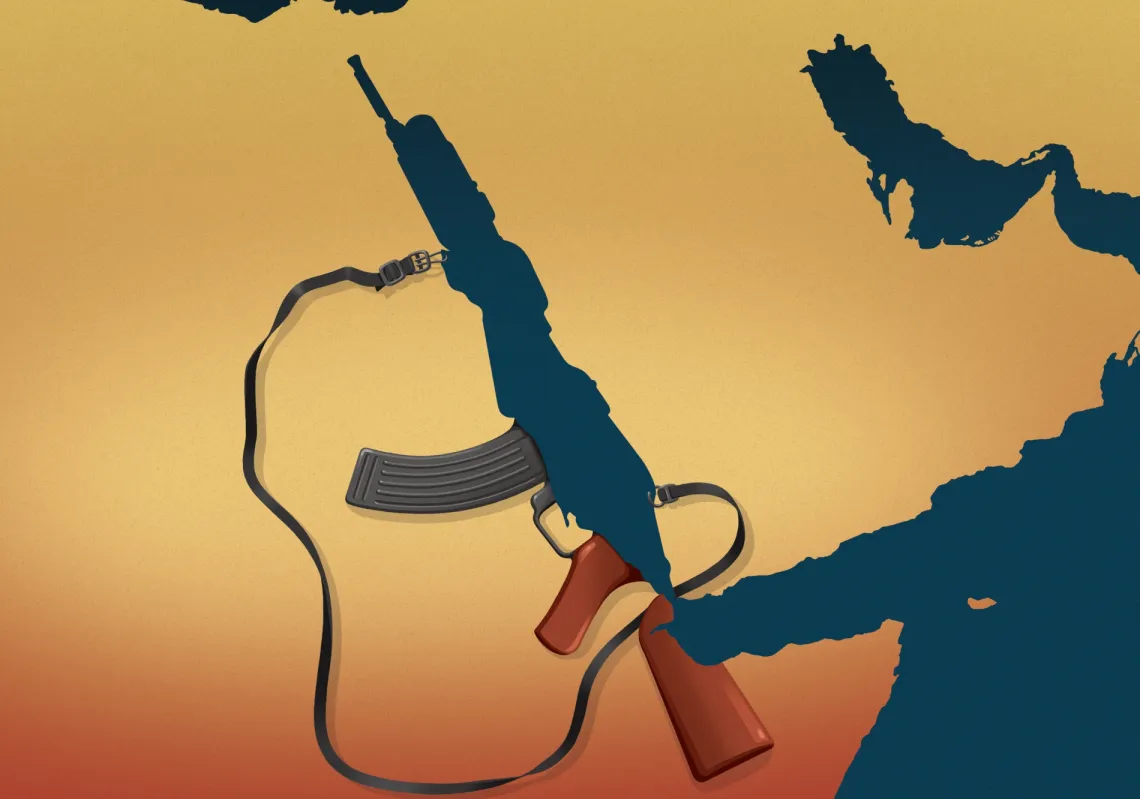 Two Afghan National Police keep watch on the outskirts of Herat, near the border between Afghanistan and Iran, on December 13, 2012. SOURCE: Aref Karimi/AFP/Getty Images[/caption]As the Obama administration prepares its Afghan exit strategy scheduled for 2014, Iran too is weighing its options in Afghanistan. Tehran’s basic objective is to retain a dominant role in its eastern neighbor, but it faces both domestic Afghan opposition and regional rivals—such as Pakistan—equally determined to influence the course of events in the troubled state.
Two Afghan National Police keep watch on the outskirts of Herat, near the border between Afghanistan and Iran, on December 13, 2012. SOURCE: Aref Karimi/AFP/Getty Images[/caption]As the Obama administration prepares its Afghan exit strategy scheduled for 2014, Iran too is weighing its options in Afghanistan. Tehran’s basic objective is to retain a dominant role in its eastern neighbor, but it faces both domestic Afghan opposition and regional rivals—such as Pakistan—equally determined to influence the course of events in the troubled state.
As it intensifies its Afghan efforts, Tehran appears to be relying on two principle approaches. First, it is increasingly touting it intervention as inevitable, an economic necessity for Afghanistan. Secondly, Tehran is looking to create the maximum possible agreement with those regional states that share some or all of Tehran’s interests in Afghanistan. On that list, India stands out.
Providing basics
Recent weeks have witnessed a flurry of Iranian overtures toward Kabul. The most recent example was the 28 January visit of Iran’s energy minister, Majid Namjou, who launched two Iranian-made electric turbines for power generation in the western Afghan province of Herat, which borders Iran. Dispatching Namjou to Kabul---where he also met President Hamid Karzai---was not a coincidence. Tehran is fully aware that Afghanistan suffers from both energy shortages and an unreliable supply. The Iranians are therefore promoting closer energy relations as an important driver in bilateral ties. This includes an announcement of a pipeline to carry Iranian oil to Afghanistan.
But leverage over energy supply is not the only card Tehran sees itself holding as it deals with the Afghans. Iranian media reported in December 2012 that overall trade between the two countries has increased from USD 500 million to USD 2.2 billion between the years 2006 and 2012. Tehran is also quick to point out that it provides land-locked Afghanistan with an important alternative transit route to global markets, given that routes via Pakistan frequently fall victim to Taliban attacks or political disputes between Kabul and Islamabad. Meanwhile, in Kabul, Namjou asked President Karzai to open up his country to more Iranian companies and investments.
The unambiguous message from the Iranians is that ties between Iran and Afghanistan are an economic necessity, as an impoverished Afghanistan ponders its future after the US scales back its involvement in the country. The intention is also to grab American attention by showcasing Iran’s economic leverage. The blueprint Iran is offering Washington is straightforward on paper: if the United States wants the Afghans to stand on their feet economically, then Iran is the inevitable part of the equation. The need for Iranian economic involvement, or so the message from Tehran goes, is particularly strong in in western and northern Afghanistan, where Iranian influence has historically been most prominent.
In mid-January, a senior Iranian national security official, Hossein Sheikholeslam, put political subtleties aside and went further in making this very point. He explained that Iran “can help the US to have an honorable and low-cost withdrawal from Afghanistan,” and stated that Tehran is “ready to hold talks with Washington just like it did before US troops pulled out of Iraq.” Sheikholeslam denied rumors that Tehran and Washington have already held direct talks about the future of Afghanistan, but said that Tehran is “ready to discuss Afghanistan issues with Americans in Afghanistan with Afghans present, to assure them that we do not intend to take [the Americans’] place in Afghanistan or take advantage of their absence.”
As it did in Iraq after the US invasion, Iran has systematically worked to build relationships across Afghanistan since 2001. Beside its robust economic presence, Iranian influence is very noticeable among Afghan media outlets and educational institutions thanks to Iranian funding and its persistent efforts to build ties. Meanwhile, many Afghan politicians are seen either as pro-Iranian or unwilling to go head-to-head with Tehran.
This was the point made by Amrullah Saleh, the former head of Afghanistan’s intelligence service. On 24 January, Saleh accused Iran of an extensive and multi-pronged campaign to increase Tehran’s influence in Afghanistan, a policy that he said is also designed to weaken the Afghan–US partnership. Rather controversially, Saleh specifically claimed that Afghanistan’s minority Shi'a community has been targeted by the Iranians---a charge that was widely criticized by Shi'ite Afghan commentators. Whether Saleh’s concerns will be echoed by other senior Afghan figures remains to be seen, but this is without doubt a development that would worry Tehran. Anti-Iran sentiment among the Afghan public is also a factor that can work against Tehran’s plans. The most recent example of this occurred in late December, when angry protestors attacked Iran’s consulate in Herat to denounce Tehran’s attitude toward Afghan immigrants. Iran, however, can reassure itself with the fact that until now its carrot-and-stick strategy vis-à-vis Afghanistan has largely mollified officials in Kabul.
Iran, the US and the regional play
Tehran’s ambitions in Afghanistan are not solely US-centric. Shi'a Iran is very concerned about the return of hardline Sunni Taliban to corridors of power in Kabul, attentive to the fact that this is a scenario favored by its regional rivals. Accordingly, from the beginning Tehran has been against President Karzai’s attempts to reach out to the Afghan Taliban. Iran is particularly suspicious of Qatari and Saudi roles in the reconciliation process.
This Iranian reluctance to see the return of the Taliban is shared by the Indian government. That is exactly the reason why Iran sent one of its top diplomats to New Delhi for discussions about the future of Afghanistan in early January. Saeed Jalili, the secretary at Iran’s Supreme National Security Council, reportedly pushed the Indians to revive the anti-Taliban front that India, Iran, and Russia set up to confront the Taliban in the 1990s. This was a zero-sum game, one in which the Pakistan-backed Taliban prevailed on the battlefield. Iran is seemingly preparing—and looking for old and perhaps new partners—for a new regional bloc to come together against the potential return of the Taliban to power.
There is also no doubt that Tehran regards its extensive influence in Afghanistan as a potential bridge between Iran and the United States. In other words, as Iran continues to look for a “grand bargain” with Washington; no other topic is as consistently mentioned as finding common ground with the US on the issue of the future of Afghanistan. Still, thanks to the convoluted and hostile Iran–US relationship, Tehran will find it very hard to position itself as a partner for the US in its Afghan exit strategy. But joint Iranian–Indian regional efforts, along with other regional partnerships, could do more to convince Washington as it contemplates its options for the post-2014 era---particularly if supported by the Afghans.








